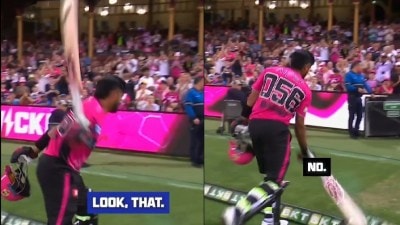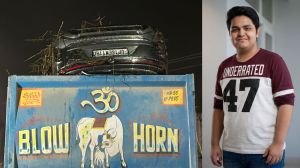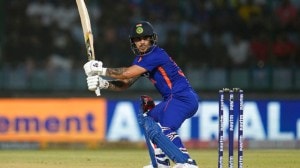Retrace Bapu146;s footsteps
I was sad to notice that not one of them 8212; the president, the vice president, the prime minister, the leader of the opposition 8212; a...

I was sad to notice that not one of them 8212; the president, the vice president, the prime minister, the leader of the opposition 8212; attended the special commemorative evening prayer on Mahatma Gandhi8217;s Martyrdom Day. As usual, it was held at 5, Tees January Marg where Gandhi was shot dead. All the people I have mentioned laid wreaths at Rajghat in the morning but abstained themselves in the evening. This was unprecedented.
I mean no disrespect to the president. He is the head of our state. But his absence was noted regretfully. That he was not in the capital does not say much. If he could be at Rajghat, he could have postponed his departure to be present at the special meeting, which is an intimate and sentimental part of Martyrdom Day. The one at Rajghat is formal where the three service chiefs are also in attendance.
I do not expect BJP leaders, either Prime Minister Atal Bihari Vajpayee or his deputy, L.K. Advani, to attend a prayer meeting held at the spot where a Hindu fanatic connected with the RSS killed the Mahatma. Their explanation was that they had to be present in Parliament because of the railway budget. Strange, the budget was presented to the Lok Sabha several hours before the prayer meeting. If need be, Parliament could have been adjourned at 3 p.m. to let the prime minister and others attend the special prayer meeting. After all, both Houses wound up their business on the opening day because of the demise of some members between sessions.
No doubt, the ruling BJP has different views on Gandhi. But he is the father of the nation. Anything done to belittle him or slight his memory would be in bad taste. Moreover, the prime minister is the ex-officio president of the Gandhi Smriti and the Darshan Samiti which organise the special prayer meeting. Whichever the government or whatever its colour, certain things are too sacred to be violated. The Mahatma8217;s Martyrdom Day is one of them.
I recall that Prime Minister Jawaharlal Nehru was not present in the House when references to the sudden death of Dr Rajendra Prasad, India8217;s first president, were made. A top Congress leader, Acharya Kripalani, while regretting the absence of Nehru, remarked cynically that perhaps Rajan Babu should have intimated Nehru beforehand about his death so that Nehru could have arranged his schedule accordingly. Subsequently Nehru offered profuse apologies for his absence.
In any case, the RSS 8212; the BJP is its political limb 8212; has never given the Mahatma his due. In fact, the RSS was banned after his assassination. His picture is not displayed at its Nagpur headquarters among the array of photographs. His name was included in the RSS prayer only during the Emergency because Jayaprakash Narayan, a Gandhian, was the symbol of defiance and to get credibility the BJP was following him relentlessly.
It is probably understandable because Gandhi was opposed to Hindutva, which the BJP advocates. But the government cannot and should not give the impression of being indifferent to his memory. All governments, including the one headed by Vajpayee, should not forget that they would not have ruled India if the Mahatma had not liberated it from the British yoke. Advani often compares the Mahatma8217;s Dandi march to his rath yatra to Ayodhya 8212; from the sublime to the ridiculous. Advani8217;s rath yatra polarised society in the north and resulted in the killings of hundreds of Muslims. The Mahatma8217;s movement united Hindus and Muslims who came out into the streets to support him. The British beat them up mercilessly but they remained non-violent. In fact, Advani was alleged to have been part of the conspiracy in the demolition of the Babri Masjid 8212; a charge Mulayam Singh Yadav8217;s government did not include in its affidavit for obvious reasons.
The absence of Sonia Gandhi from the meeting is neither explainable nor excusable. The Congress made a fuss in Lok Sabha about the Speaker8217;s failure to mention Martyrdom Day. But its president was conspicuous by her absence at the evening meeting. Indira Gandhi did not miss any. The Congress exploits the Mahatma8217;s name but pays mere lip service to his teachings. Left to him, Bapu would have disbanded the Congress after independence. He wanted to convert it into a seva dal so that the party would not take sole credit for winning independence.
Since the president was out of Delhi, he was not available to host nearly 2,000 delegates, including some 75 former heads of state and former prime ministers from different countries, who attended the Global Convention on Peace and Non-Violence on January 31 and February 1. The convention discussed how to divert the world8217;s attention from violence to non-violence, which was Gandhi8217;s way of solving problems.
If political leaders were indifferent to the special prayer meeting, the media were no better. Probably, the subject gave no scope for the page three type of journalism which now dominates the print and electronic media. The convention had the battle-scarred faces from the days of Gandhi and Jayaprakash. There was no star attraction. Once the prime minister8217;s speech was over, the media8217;s job was finished.
Nonetheless, the convention adopted a declaration which is relevant today: Strengthen the UN and the Security Council to prevent unilateral action for the resolution of disputes in violation of the provisions of its charter, restructure the UN so as to reflect the changed equations since the charter was framed, combat terrorism and end the crimes perpetrated by terrorists by mobilising strong public opinion, and bring pressure through the non-government sector and the UN for progressive reduction of all arsenals and achieve complete disarmament within a reasonable time span. The weakest part of the convention was the follow-up. It asked the countries to report to the Gandhi Smriti on the action they would take on the decisions at the convention. But the Smriti is not an independent body and the Indian prime minister is its ex-officio president. If Gandhian values are to be pursued, an autonomous structure is the only way out.
- 01
- 02
- 03
- 04
- 05































